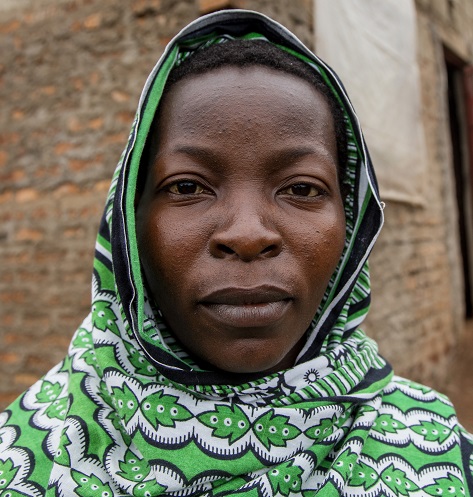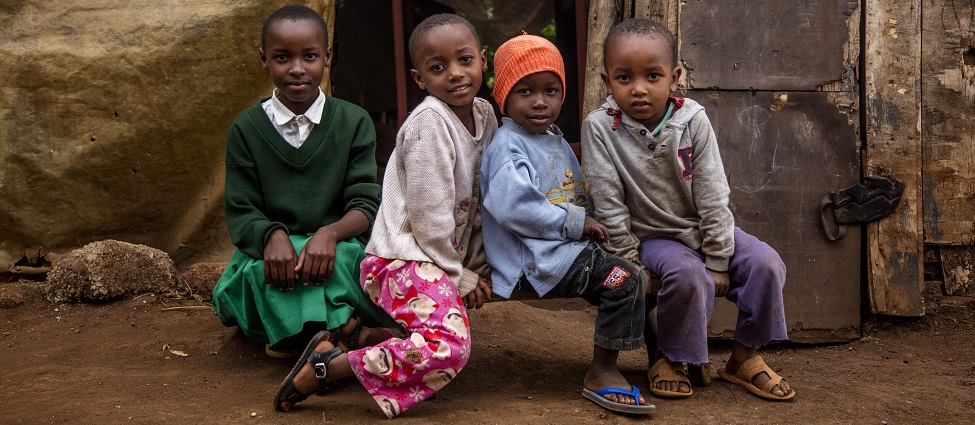Mary Mmari’s poultry business has been so successful she is known locally as ‘mama kuku’ (chicken mama) and, thanks to the income she earns, her nephew has all the books and clothes he needs for school.
Just a short while ago life was very different. The maize crop had failed and, in desperate need of money, Mary started a second-hand clothes business but lack of demand meant this too failed. Mary explains, “I could see my friends doing well and wanted to be like them. I was doing it [business] without knowing how.”
Then Mary joined Hand in Hand where she learned how to run a business and how identify local market demand. She decided to start a poultry and borrowed TZS 800,000 (US $340) from her Hand in Hand savings group to purchase her first 100 chicks, build a chicken shed, and buy initial feed and vaccinations.
Mary’s first batch of chickens was sold within three months, and she made a profit of TZS 400,000 (US $174). With Hand in Hand’s guidance, Mary made her own chicken feed for the next 100 chicks she raised, increasing her profit to TZS 550,000 (US $233).
Elitruda, poultry entrepreneur
Elitruda is proud of her newly purchased flock of 90 chickens, the eggs from which bring in some TZS 169,000 (US $71) per week, all year round. Looking back she says, “We had to make sacrifices and be disciplined to save the money we needed. We had to deal with needs, not wants.”
Before joining the Hand in Hand business programme, Elitruda and her husband Helman, depended on just 10 chickens and the few vegetables they grew on their plot of land for food and, occasionally, income. Today, Elitruda has learned how to run a business, how to save and the “dos and don’ts of credit.”
She has already repaid the loan of TZS 300,000 (US $127) which she used to renovate the chicken shed and then purchase those first 90 chickens. She plans to reinvest profits to expand the business to some 500 chickens.
‘I am so excited’: Faith
This is a story about Faith.
For years, Faith’s husband had a job as a plumber. It wasn’t glamorous, but it didn’t have to be: 200,000 Tanzanian shillings (US $86) a month was more than enough to provide for their four young children.
One day, Faith’s husband lost his job. The family home soon followed, replaced by a cinderblock shed with two rooms. Next went the children’s school supplies, followed by 8-year-old Loveness’ allergy medicine, but even then they couldn’t stop. The day she realised her family could no longer afford to eat lunch, Faith felt her world shrink to the size of six stomachs. Today, like tomorrow and the day after that, her children can look forward to two meals: a cup of chai tea for breakfast and a supper of maize and beans.
Faith turned to despair.
Stormclouds gather

Faith at home
In rural Tanzania, poverty looms like a physical presence. According to the United Nations more than half of Faith’s neighbours live on less than US $1.90 a day, and unlike most of them she has no smallholding to help see her through.
But Faith’s family isn’t impoverished for lack of trying. Seven days out of seven her husband hitches a ride into nearby Arusha town looking for day labour, arriving back home with TZS 5,000 (US $2.15) here and TZS 2,000 (US $0.85) there and, some nights, nothing at all.
Last year, Faith decided it just wasn’t right to depend on her husband for everything, and after scraping together some money she borrowed from friends and family, opened up a shop in front of her home selling rice, potatoes and maize. Instead of turning a profit, she found herself raiding her stock to help feed her children, and the business soon collapsed.
The odds had always been stacked against her. Between cultural norms that prevent women from socialising – in other words, from building networks – and one of the most hostile credit environments for women on Earth, Tanzania is a place where businesswomen rarely succeed.
Faith hears a knock
One day, Faith heard a knock on her door. It was Hand in Hand, an NGO that had just arrived in her village promising free business and skills training. From the very first moment, she says, her commitment was total.
“I’m so excited every day in my Self-Help Group to learn business skills. I don’t want the business to fail like last time,” she explains. “Already, I’ve learned that if I take something from my store I’ll have to pay for it.”
It’s still early days, and Faith still has months’ worth of lessons to go. But the future, she says, is finally looking brighter. “As soon as I have some money I will be able to buy school books and send the children to school. Then they can get a good job and help me financially.”
And just like that, for the first time in a long time, despair has turned back into to faith.

Faith’s children Loveness, 8 (far-left), and Isaac, 4 (second from right), and their friends.
